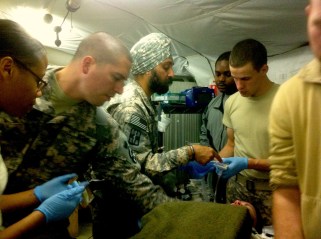After James Holmes launched a Batman-movie massacre in Colorado on July 20 that killed 12, the U.S. Army quickly issued a statement declaring that he had never served in an Army uniform. Monday morning, Aug. 6, alas, Battleland had to ask the Army about Wade Michael Page’s military background to confirm initial sketchy reports that he was a veteran. Police killed Page after he mortally wounded six people at a Sikh temple in Oak Creek, Wis., Sunday morning.
“He was a white supremacist and a member of a neo-Nazi punk band,” one Army veteran groused, “but it will be his military service that gets all the attention.” In fact, Page was reportedly dishonorably discharged from the Army. Nonetheless, the military connection pains many in the Army, including a onetime top Army psychiatrist as well as the first Sikh to earn a Bronze Star, for his combat service last year in Afghanistan.
Page “does not represent military sentiment,” Army Major Kamal Kalsi tells TIME. “And I am a testament to that, being a turbaned Sikh in the military.” Kalsi says he is one of only three turbaned Sikh soldiers in the U.S. Army and among the first in 30 years to be able to wear his turban, retain his long beard and hair and keep his kirpan — the ceremonial knife carried by Sikhs — underneath his uniform, so long as its blade is no longer than three inches.
(PHOTOS: Wisconsin Community Reacts to Shocking Attack)
“I’ve know the military to be a very welcoming place in terms of diversity and cultural awareness,” says Kalsi, 36, who has served as an Army doctor at Fort Bragg, N.C., for two years. “It is unfortunate that he had ties to the military.”
The Army’s former top psychiatrist urges caution before linking Page’s horrific act to his military duty. “It is too early to know whether or not his military service, which ended with a dishonorable discharge and reduction in rank from sergeant to specialist in 1998, had anything to do either with his neo-Nazi leanings or the shooting,” says Elspeth Ritchie, now a Battleland contributor. “But we do know that he didn’t serve in combat. Hopefully this tragic episode will not serve to further stigmatize those who have served honorably.”
Page, 40, died in a hail of police bullets Sunday. He had earned several commendations — including five achievement medals, two good-conduct medals and a humanitarian-service medal — but Army officers and veterans likened them to perfect-attendance awards.
His final Army posting was at Fort Bragg, where neo-Nazi sympathizers were discovered at about the same time Page served there. But Kalsi says he has witnessed no anti-Sikh sentiment at Fort Bragg. “Not a day goes by that when I’m checking in at one of the gates they’ll say, ‘Hey, that’s really cool,’ referring to my turban,” he says. “It’s very strange and shocking to me that this fellow had connections to the military.”
(MORE: Sikh Temple Shooter Identified, Had Ties to White-Supremacist Movement)

Kalsi photo
Kalsi says he had to convince the Army that the turban wouldn’t interfere with military work (Sikhs wear a bandanna-like version when wearing helmets or playing sports), that his beard wouldn’t interfere with his ability to wear a gas mask (“A little bit of Vaseline goes a very long way”) and that Sikhs wouldn’t hurt the Army’s morale if allowed to broadcast their religion. “Those were the same arguments used to keep out blacks as well as women,” Kalsi says. “By our service — and certainly the Bronze Star — I think that shows that esprit de corps has not been an issue.”
Kalsi observes that Page may have mistaken Sikhs for Muslims. “Every time there is anti-Muslim sentiment in this country, the Sikhs pay the price,” he says. “It’s unfortunate, but after 9/11 we’ve felt like we’ve had to prove our American-ness. We’ve paid the price, perhaps more dearly, than any other minority in this country since 9/11.” After all, he continues, “I’m the guy at the airport who’s sort of randomly selected every time for a secondary screening.”
The fact that Page left the Army nearly 14 years ago is likely to get lost amid the fact that he served as a psychological-operations specialist, with all the baggage the psyops field carries. The Army says that someone in Page’s military occupational specialty would be “primarily responsible for the analysis, development and distribution of intelligence used for information and psychological effect.”
The Army says someone in his slot today would:
• Research and analyze methods of influencing foreign population from a variety of information sources
• Operate and maintain equipment such as ground tactical vehicles and shelter systems, loudspeaker systems, state-of-the-art computers, analog and digital recording and playback devices and communication systems
• Travel to overseas locations in peace, crisis and conflict to assist U.S. and foreign governments, militaries and civilian populations
The Army adds that such training can help a veteran gain employment in “public relations, sales, marketing and advertising. Because of the time you’ll spend studying foreign cultures and social systems, you can explore a future career in the diplomatic service or as an anthropologist, journalist, social scientist, statistician, market analyst, advertising consultant or sales manager.”
Speaking of careers, Kalsi represents the fourth generation of his family to serve in the military. “All of us Sikhs, if I can speak for the broader community, are deeply patriotic, and that’s evidenced by our long military tradition,” he says. “We are shocked that this sort of thing has happened, although, in the back of our minds, we were concerned for many years that this would eventually happen.”


